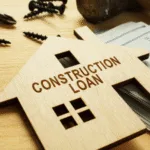 What Is a Construction Loan?
What Is a Construction Loan?
Many homeowners turn to construction loans—a specialized financing option designed to cover the costs of building or renovating a home. But how do construction loans work, and what should you know before applying for one? Let’s explore the ins and outs of this unique financing solution.
Understanding Home Building Financing
Unlike standard home loans, a building project loan provides short-term financing to cover the costs of building a new home or making significant renovations. These loans typically have higher interest rates and shorter terms, but they offer flexibility in funding different phases of the construction process.
Home building financing generally fall into two categories:
1. Construction-to-Permanent Loans
This type of loan transitions into a permanent mortgage once the construction is complete. East Coast Dream Homes offers this as our Dream Loan. It’s a convenient option for homeowners who want to avoid refinancing later.
2. Stand-Alone Construction Financing
Stand-Alone Construction Financing require borrowers to secure a separate mortgage once the home is finished.
How Residential Construction Financing Works
A major difference between Home Construction Project Loans and traditional mortgages is how funds are disbursed. Rather than receiving a lump sum, borrowers get funds in installments—often referred to as “draws.” These draws are released as different stages of construction are completed. Lenders typically require inspections before approving each draw to ensure the work aligns with the original plans.
Additionally, interest payments are often required during the construction period, with full repayment beginning once the home is completed or transitioned into a permanent loan.
Key Requirements for Approval
Since Home Project Financing pose a higher risk for lenders, borrowers must meet strict criteria. BankRate has essential factors in the approval process:
- Strong Credit Score: Most lenders prefer applicants with a credit score of at least 680.
- Detailed Construction Plans: Lenders require well-defined blueprints and project estimates.
- Qualified Builder: Working with a reputable contractor enhances approval chances.
- Down Payment: Expect a higher down payment—typically between 20% and 30% of the total project cost.
Expert Insights: Is a Construction Loan Right for You?
Mortgage professionals often emphasize the importance of planning when considering a Residential Construction Financing. According to financial expert Jane Smith, “Understanding the full scope of your project and working with a trusted lender can help you secure the right financing while avoiding unexpected costs.”
Additionally, builders recommend staying flexible during the process. Construction projects can face delays or unforeseen expenses, so having financial reserves can prevent issues down the road.
Final Thoughts
A Building Project loan can be a great financing tool for homeowners looking to build or renovate their dream home. While these loans require careful planning and strong financial standing, they offer flexibility and customized funding solutions tailored to construction needs. By working with experienced lenders and builders, borrowers can navigate the process smoothly and turn their vision into reality.
 What Is a Construction Loan?
What Is a Construction Loan?